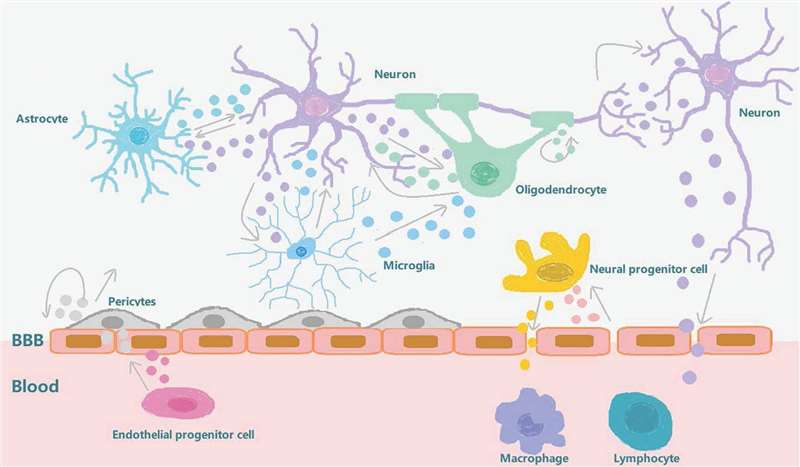Stroke Exosome Research Solution
Online InquiryStroke is a complex and life-threatening disease that is one of the leading causes of mortality and disability in the world. Due to the high incidence, there is an urgent need to develop strategies for stroke management. Exosomes are nano-sized extracellular vesicles (EVs) that have the capability to transport active substances including microRNA (miRNA) to recipient cells. A growing number of studies have shown that exosomes are an important factor in the initiation and progression of stroke. Therefore, a greater understanding of the role of exosomes and their contents in the pathogenesis of stroke could help in the discovery and development of new therapeutic approaches. In addition, exosome miRNAs have been shown to be a non-invasive biomarker for stroke diagnosis and monitoring.
The role of exosomes in stroke
Stroke is the most common cause of permanent disability in adults as well as the second-most common fatal disease in both developing and developed countries. The pathophysiology of this disease is highly associated with both genetic and environmental factors. Stroke can be divided into two subtypes, including ischemic and hemorrhagic stroke. Among them, ischemic stroke is mainly caused by thromboembolism or atherosclerosis of the blood vessels supplying the brain, which in turn leads to cerebral ischemia and hypoxia, accounting for about 87% of all strokes.
Stroke recovery is a highly interactive process involving neural stem cells and neurovascular units, in which exosomes play an important role. After a stroke, brain cells, blood cells, and endothelial cells release exosomes in response to stroke. These EVs can promote nerve regeneration, enhance neurological recovery, and regulate peripheral immune responses, participating in increasing long-term neuroprotection after stroke. Moreover, they also enhance angiogenesis, neurogenesis, axon dendritic remodeling, and brain reconstruction. Along with beneficial effects, these exosomes can also have adverse effects on distal organs, including the spleen, heart, kidney, and intestine. Exosomes in stroke have not been adequately studied compared to exosomes in tumors. Currently, studies on exosomes in stroke have focused on the neuroprotective and neuroprosthetic effects of mesenchymal stem cell (MSC)-derived exosomes.
 Fig. 1 Exosome involvement in brain reconstruction after stroke. (Liu, Wanying, et al., 2019)
Fig. 1 Exosome involvement in brain reconstruction after stroke. (Liu, Wanying, et al., 2019)
Stroke exosome research solution at Creative Proteomics
Based on cutting-edge technology, advanced platforms, and strict analysis workflows, Creative Proteomics can provide customized and comprehensive exosome research services and solutions. We offer a range of exosome multi-omics services, including exosome proteomics, exosome metabolomics and exosome lipidomics services to accelerate your relevant research progress. Notably, with efficient and economical approaches for exosome isolation and identification, we will greatly enhance your exosome research and analysis.
Specifically, we provide the following services, including but not limited to:
| Exosome analysis services | |
|---|---|
| Exosome isolation and purification | Sucrose gradient centrifugation |
| Polymer-based exosome enrichment method | |
| Immunomagnetic bead method | |
| Size exclusion chromatography method | |
| Exosome identification | Nanoparticle tracking analysis (NTA) |
| Electron microscopy analysis | |
| Western blot | |
| Exosome marker assay | Isolation and enrichment of exosomal CD9, CD63, CD81, TSG101, HSP70 proteins |
| Exosome surface protein identification and quantitative analysis | |
| Exosome engineering | Exosome labeling and tracking |
| Cargo loading | |
| Engineered exosome production | |
| Cargo loading assessment | |
| Exosomes labeling and tracking | Exosome fluorescent labeling |
| Fluorescence exosome purification | |
| Fluorescent exosome concentration labeling | |
| Exosome multiomics analysis | Exosome proteomics analysis: Exosome protein profile identification Exosome protein composition analysis Exosome protein expression level analysis Exosome protein differential expression analysis |
| Exosome metabolomics analysis: Exosome differential metabolite screening Qualitative and quantitative analysis of target metabolites/metabolic pathways | |
| Exosome lipidomics analysis: Exosome lipid composition and level analysis Differential expression analysis of exosomal lipid molecules Qualitative and quantitative analysis of targeted lipid molecules | |
| Exosomal biogenesis and identification | Our capabilities will provide strong support for the study of exosome biogenesis and its identification. |
| Exosomal cargo and loading mechanism | Our services can greatly help the study of exosomal cargo and loading mechanism, facilitating the diagnostic and therapeutic applications of exosomes. |
| Exosome function research | In vitro analysis of the function of exosomes In vivo analysis of the function of exosomes |
In recent years, exosomes have attracted widespread attention in stroke diagnosis and treatment due to their unique properties. Further studies on the molecular process of exosome induction and exosome production will certainly facilitate the development of new therapeutic strategies to reduce mortality and improve the quality of life in stroke patients. If you are interested in our services, please don't hesitate to contact us. Our experts will give you satisfactory answers and facilitate the progress of your projects.
References
- Liu, Wanying, et al. "Role of exosomes in central nervous system diseases." Frontiers in molecular neuroscience 12 (2019): 240.
- Hong, Shi-Bin, et al. "Potential of exosomes for the treatment of stroke." Cell transplantation 28.6 (2019): 662-670.
* For Research Use Only. Not for use in diagnostic procedures.



